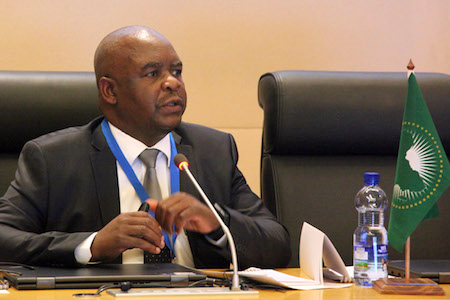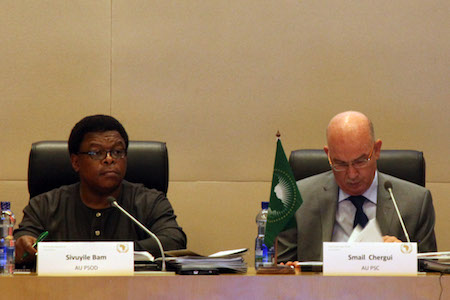Spotlight: Bridging the gap between policy and practice
ISS not only develops policy but works with police deployed on the frontline of peace support operations.
Published on 25 May 2017 in
Impact
Efforts to improve human security in Africa are often hampered by a fundamental discord between policy and practice. At the core of its approach, the Institute for Security Studies (ISS) recognises this challenge – and works to bridge it.
The ISS provides credible and timely research that allows for informed policy-making. But beyond that, the ISS also delivers practical, needs-based training. This niche approach means that policy and practice can be aligned in ways that have lasting impact.
 Crowd Chirenje, Police Coordinator in the African Union Peace Support Operations Division |
Through the Training for Peace programme and in partnership with GIZ, the ISS continues to work with the African Union (AU) to improve the role of the police in peace support operations.
‘When conflict breaks out, the police are often one of the first casualties,’ says Dr Linda Darkwa, Coordinator of the Secretariat of the Training for Peace programme, describing how conflict usually leads to a near-total collapse of local policing institutions. But faltering rule-of-law is often also a driver of the conflict.
‘When a state degenerates into conflict, it is often also due to a breakdown of rule-of-law,’ says Darkwa. ‘Rule-of-law is the work of the police. So, if you want to address the sources of conflict, you will need to address rule-of-law issues.’
As conflict dies down, the role of the military lessens, and it is mainly up to the policing component of peace support operations to protect civilians, rebuild crucial institutions and re-establish public trust.
ISS has been instrumental in the formation and role of the AU’s Police Strategic Support Group
The ISS has worked since 2013 to make sure the role of police in peace support operations is adequately recognised.
One way that this has happened is through the establishment of the Police Strategic Support Group (PSSG), which started its work in 2014. In December 2016, at the opening of the second PSSG conference in Addis Ababa, AU Peace and Security Commissioner, Smaïl Chergui, noted that: ‘In Africa and beyond, the police have a natural and core mandate of protection of civilians; and is also the first point of contact and interaction with communities in the justice delivery system.
 Anand Pillay, Police Commissioner, AMISOM |
‘The establishment of the PSSG and AFRIPOL are some of the concerted efforts that the African Union Commission is making to address existing challenges to enhance policing capacities.’
The ISS has been instrumental in the formation and role of the PSSG. Crowd Chirenje, Police Coordinator in the AU Peace Support Operations Division, describes ISS as ‘one of the midwives’ of the PSSG.
But ISS also works closely with police to enhance how they implement their mandate on the frontline of peace support operations.
For example, during 2016 the ISS collaborated with the African Union Mission in Somalia (AMISOM) and the AU to develop an AMISOM-specific police pre-deployment training programme and manual, which is currently in its final stages.
‘We have been sending our police officers who are working in the mission to attend these pre-deployment training development workshops,’ says Anand Pillay, Police Commissioner of the African Union Mission in Somalia (AMISOM). ‘The pre-deployment training curricula and training manuals are mission-specific for the AMISOM Police Component, and they will be used to prepare individual police officers prior to their deployment into the mission.
‘We will ensure that the individual police officers are prepared for the job ahead,’ Pillay adds. ‘These workshops have helped us to start putting in place mechanisms to address shortcomings that we have experienced. Once the African Union Police Standard Operational Procedures are approved – which were developed with assistance of the ISS – it will streamline and standardise all police operations within the AU Peace Support Operations. We’ve come a long way.’
 Sivuyile Bam, head of the AU Peace Support Operations Division, and the AU Commissioner for Peace and Security, Ambassador Smaïl Chergui, open the second PSSG conference in December 2016 |
In August 2017, the police pre-deployment training will be piloted at a workshop in Zambia, where the course will also be validated. This will be followed by a training of trainers workshop for police contributing countries that send individual police officers to be deployed in missions.
In 2018, these courses are expected to be developed into a generic police training programme for individual police officers to prepare police for any mission in Africa.
With input from AMISOM, the regional standby forces, ISS and other key partners, the PSSG has delivered robust recommendations to tackle the challenges confronting police in peace support – both in policy and in practice.
‘Through the PSSG, we are also rendering support in the development and establishment of an AU Police Roster,’ says Riana Paneras, an ISS senior researcher who previously served as the police commissioner for the African Union–United Nations Mission in Darfur.
‘We will also this year focus on developing guidelines and standard operational procedures on performance management, the roles and responsibilities of the police, ranking system and training certification and accreditation.’ Paneras has also been requested to be the police expert in the Independent Panel for Verification of the African Standby Force.
For more information, contact:
Riana Paneras, +251 96 857 8397, [email protected]
Pictures: ©Jacqueline Cochrane/ISS

